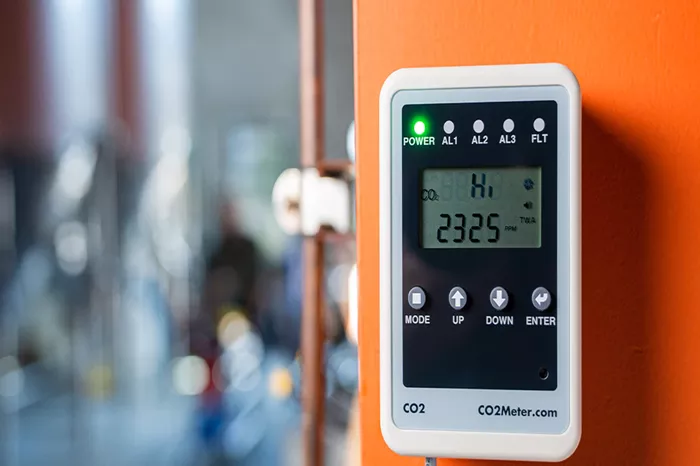Natural gas is a vital energy source used in homes and industries worldwide. Understanding how to detect it is crucial for safety and efficiency. One common question is whether a CO2 detector can detect natural gas. This article explores the differences between CO2 and natural gas, how detectors work, and whether CO2 detectors are effective for detecting natural gas leaks.
Understanding CO2 and Natural Gas
What is CO2?
Carbon Dioxide (CO2) is a colorless, odorless gas produced by burning fossil fuels and organic matter. It is a natural part of the Earth’s atmosphere and is essential for plant photosynthesis.
Sources of CO2:
1.Combustion of fossil fuels (coal, oil, natural gas)
2.Respiration by animals and humans
3.Decomposition of organic matter
What is Natural Gas?
Natural Gas is a fossil fuel consisting primarily of methane (CH4). It is used for heating, electricity generation, and as a fuel for vehicles. Unlike CO2, natural gas is highly flammable.
Composition of Natural Gas:
1.Methane (CH4) – 70-90%
2.Ethane (C2H6), Propane (C3H8), Butane (C4H10) – small percentages
3.Trace amounts of other gases
Differences Between CO2 and Natural Gas
Chemical Composition:
1.CO2: One carbon atom and two oxygen atoms.
2.Natural Gas: Mostly methane, composed of one carbon atom and four hydrogen atoms.
Properties:
1.CO2: Heavier than air, non-flammable, and not detectable by smell.
2.Natural Gas: Lighter than air, highly flammable, and has a distinct odor due to added mercaptan for leak detection.
How CO2 Detectors Work
Principle of CO2 Detection
CO2 detectors use infrared sensors to measure the concentration of CO2 in the air. The infrared light passes through a sample of air, and the amount of light absorbed by CO2 molecules is measured.
Key Components:
1.Infrared Light Source
2.Sample Chamber
3.Detector
4.Processor
Operation of CO2 Detectors
Sampling: Air is drawn into the sample chamber.
Detection: Infrared light passes through the air sample.
Measurement: The detector measures the amount of light absorbed by CO2.
Processing: The processor calculates the concentration of CO2 based on the absorption.
Applications of CO2 Detectors
Indoor Air Quality Monitoring: Ensuring proper ventilation in buildings.
Industrial Processes: Monitoring CO2 levels in manufacturing.
Agriculture: Controlling CO2 levels in greenhouses.
Can CO2 Detectors Detect Natural Gas?
Detection Mechanism
CO2 detectors are designed specifically to measure CO2 levels. They do not have the capability to detect other gases, including natural gas. The infrared sensors in CO2 detectors are calibrated to respond to the unique absorption characteristics of CO2 molecules.
Limitations of CO2 Detectors
Selective Detection: Only detect CO2, not hydrocarbons like methane.
Sensor Calibration: Calibrated for CO2, making them ineffective for other gases.
Safety Risks: Relying on a CO2 detector for natural gas detection can lead to undetected leaks and potential hazards.
Why CO2 Detectors Cannot Detect Natural Gas
Different Chemical Properties:
Absorption Characteristics: Methane and CO2 have different infrared absorption characteristics, making CO2 sensors unresponsive to methane.
Molecular Structure: The structure of methane and CO2 molecules affects how they interact with infrared light.
Sensor Design:
Specialization: CO2 sensors are specialized for a specific gas and cannot be repurposed for detecting other gases without significant modifications.
See also: Would a Carbon Monoxide Detector Detect a Gas Leak?
Alternatives to CO2 Detectors for Natural Gas Detection
Natural Gas Detectors
Sensor Types: Catalytic bead sensors, infrared sensors, semiconductor sensors.
Functionality: Detects the presence of hydrocarbons like methane by measuring changes in resistance, temperature, or light absorption.
Types of Natural Gas Detectors
Catalytic Bead Sensors:
Working Principle: Detects gas by oxidation of the gas on a heated platinum wire, causing a change in resistance.
Advantages: Reliable and widely used in industrial applications.
Infrared Sensors:
Working Principle: Measures the absorption of infrared light by gas molecules.
Advantages: Highly accurate and suitable for various environments.
Semiconductor Sensors:
Working Principle: Uses metal-oxide semiconductors that change resistance in the presence of gas.
Advantages: Cost-effective and commonly used in residential detectors.
Choosing the Right Detector
Factors to Consider:
Environment: Industrial vs. residential use.
Gas Types: Specific gases to be detected.
Sensitivity: Required sensitivity and accuracy.
Installation: Ease of installation and maintenance.
Importance of Proper Gas Detection
Safety Concerns
Exposure to Natural Gas: Can cause headaches, dizziness, and in severe cases, asphyxiation.
Explosion Risk: Natural gas leaks can lead to explosions if not detected and addressed promptly.
Regulatory Compliance
Standards and Regulations:
OSHA: Occupational Safety and Health Administration standards for gas detection in workplaces.
NFPA: National Fire Protection Association guidelines for gas detection and safety.
Best Practices for Gas Detection
Regular Maintenance:
Calibration: Regular calibration of detectors to ensure accuracy.
Inspection: Routine inspections to identify and rectify any issues.
Installation Guidelines:
Placement: Strategic placement of detectors in areas prone to leaks.
Integration: Integrating gas detection systems with alarm and ventilation systems.
Conclusion
A CO2 detector cannot detect natural gas due to the differences in their chemical properties and the specialized design of CO2 sensors. For effective natural gas detection, it is essential to use detectors specifically designed for hydrocarbons like methane. Ensuring proper gas detection is crucial for safety, regulatory compliance, and preventing health hazards. Understanding the limitations and appropriate use of different gas detectors helps in making informed decisions for safety and efficiency in various environments.
Related topic:
Will Natural Gas Be Phased Out? [Revealed]

